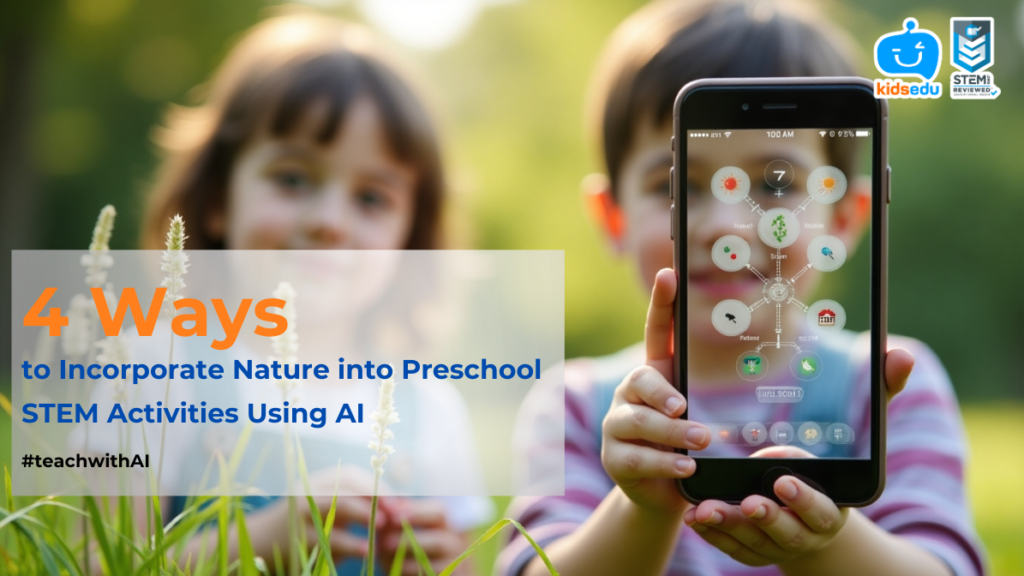Nature plays a crucial role in early childhood education, fostering curiosity, environmental awareness, and critical thinking skills. Integrating nature into STEM (Science, Technology, Engineering, and Math) activities helps young learners develop a deeper connection with the world around them.
At KidsEdu, we believe in using innovative technologies like Artificial Intelligence (AI) to enhance preschool STEM experiences. AI-powered tools can make nature-based learning more interactive, engaging, and accessible. Here are four effective ways to bring nature into the classroom using AI.
1. AI-Powered Nature Exploration
Children are naturally curious about the world around them. AI-driven image recognition apps can help them identify plants, animals, and insects during outdoor learning sessions. These tools encourage scientific observation and allow kids to connect technology with real-world nature exploration.
For example, apps like Seek by iNaturalist use AI to instantly recognize plants and animals, turning nature walks into exciting discovery adventures. Similarly, Google Lens enables children to snap photos of flowers, trees, or insects and learn fascinating facts about them.
By using AI-powered nature exploration tools, preschoolers can develop early scientific inquiry skills while fostering a love for the environment.
🔹 Recommended Apps:
- 🌿 Seek by iNaturalist – Instantly identifies plants, insects, and animals using AI-powered image recognition. The app also offers fun challenges and badges to engage children.
- 📸 Google Lens – Allows children to take pictures of nature and discover facts about plants, flowers, and animals through AI-powered searches.
2. AI-Supported Weather and Climate Learning
Understanding weather and climate is an essential part of STEM education. AI-powered weather forecasting tools can help preschoolers learn about seasons, temperature changes, and climate patterns in an interactive way.
Voice assistants like Google Assistant and Alexa can answer simple weather-related questions, making it easier for young learners to grasp concepts such as rain, wind, and sunshine. Additionally, apps like Windy.com use AI to provide real-time weather predictions, helping children visualize storms, wind patterns, and temperature changes.
By incorporating AI into weather learning, children can develop early meteorology skills and gain a better understanding of how nature works.
🔹 Recommended Tools:
- 🌤️ Google Assistant or Alexa – Voice-activated AI tools that can answer weather questions and help plan outdoor STEM activities.
- ☔ Windy.com – A visually engaging weather app that uses AI to predict rainfall, storms, and wind patterns, making weather lessons interactive and fun.
3. AI-Enhanced Virtual Nature Walks
For schools in urban areas with limited access to natural spaces, AI-powered virtual reality (VR) and augmented reality (AR) apps can create immersive nature experiences. These tools allow preschoolers to explore forests, oceans, and wildlife habitats without leaving the classroom.
Apps like Google Expeditions offer virtual field trips to rainforests, coral reefs, and national parks, providing children with a 360° interactive learning experience. Meanwhile, Animals 4D+ uses AR technology to bring animals and plants to life through flashcards, making nature exploration more engaging and hands-on.
By using AI-enhanced virtual nature tools, preschoolers can experience the wonders of nature even in indoor learning environments.
🔹 Recommended Apps:
- 🌳 Google Expeditions (AR/VR) – Offers virtual field trips to rainforests, oceans, and national parks with engaging 360° views.
- 🦋 Animals 4D+ (by Octagon Studio) – Uses AR technology to bring animals and plants to life from flashcards, making nature exploration interactive and exciting.
4. AI in Sustainable Gardening Projects
Gardening is a fantastic way to teach children about plant life cycles, sustainability, and environmental responsibility. AI-powered gardening tools can help preschoolers monitor plant health and understand how different factors affect plant growth.
For example, Plantix is an AI-driven plant care app that identifies plant diseases and provides care tips through image recognition. Meanwhile, Grow Garden is a child-friendly app that teaches sustainability and composting through interactive gardening activities.
By using AI in gardening projects, children can develop early agricultural and environmental science skills, fostering a deeper appreciation for nature.
🔹 Recommended Apps:
- 🌱 Plantix – An AI-driven plant care app that identifies plant diseases and provides care tips through image recognition. Ideal for classroom gardening projects.
- 🌞 Grow Garden (by Gro Play) – A child-friendly app that teaches sustainability and composting through interactive gardening activities.
Integrating AI into nature-based STEM activities provides preschoolers with exciting and meaningful learning experiences. These approaches not only enhance STEM skills but also nurture a love for the natural world, encouraging children to become future innovators and environmental stewards.
By integrating AI into nature-based STEM activities, KidsEdu provides preschoolers with exciting and meaningful learning experiences. These approaches not only enhance STEM skills but also nurture a love for the natural world, encouraging children to become future innovators and environmental stewards.
📌 Explore more STEM activities at KidsEdu: KidsEdu STEM



 VietNam
VietNam